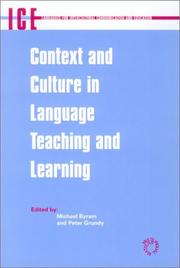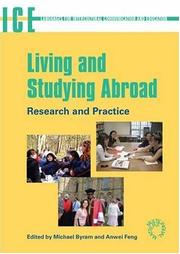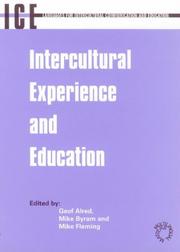| Listing 1 - 4 of 4 |
Sort by
|


ISBN: 1853596574 9786610739318 1280739312 1853596728 9781853596728 9781853596575 Year: 2003 Volume: 6 Publisher: Bristol Blue Ridge Summit
Abstract | Keywords | Export | Availability | Bookmark
 Loading...
Loading...Choose an application
- Reference Manager
- EndNote
- RefWorks (Direct export to RefWorks)
The now familiar forces of globalisation and internationalisation are influencing the role and significance of language teaching and learning in contemporary classrooms. This affects the ways in which English is taught and learnt in particular but is also an inevitable factor in all language teaching and learning. The authors of the chapters in this book all share a concern to explore the ways in which the contexts in which language teaching takes place impact on the aims and the methods of language teaching. Some do so by discussing the implications for what research we do and how we do it; Kramsch, for example, explains in detail how her own research evolves from issues which arise in the classroom. In other chapters the changing nature of the teaching of English is presented from empirical research; Decke-Cornill, for example, identifies different philosophies of language teaching among different kinds of English teacher in Germany. Other authors present studies of the ways in which what learners bring to the learning process from their own contexts and languages has to be taken into consideration if we are to understand language learning; Holme shows this from close analysis of the acquisition of metaphorical language, and Wendt argues for the importance of a social constructivist theory of language learning. Our common purpose is to take a fresh look at teaching and research through the perspective of the inevitable connections between contexts, cultures and classrooms.


ISBN: 1280609656 9786610609659 1853599123 9781853599125 9781280609657 1853599115 1853599107 9781853599118 9781853599101 6610609659 Year: 2006 Publisher: Bristol Blue Ridge Summit
Abstract | Keywords | Export | Availability | Bookmark
 Loading...
Loading...Choose an application
- Reference Manager
- EndNote
- RefWorks (Direct export to RefWorks)
The internationalisation of higher education has led to study abroad being a large scale phenomenon. Students spend short periods on study tours or a year or more taking courses in foreign universities. Studying aboard cannot be dissociated however from learning to live in another country and culture. The need to adapt to a new education system is obvious but the inevitable difficulties of living in another culture for the purpose of study are also an important facet of the whole experience. Chapters in this book report research into this whole phenomenon. Authors have researched students travelling across the world, from East to West and West to East, and also the effects of studying in countries which seem to be more like students’ own. Each chapter explains the case in question, the findings from the research and what the implications might be. The second part of each chapter is then a critical reflection on the research methods used. The book thus provides a guide to the complexity of this kind of research and how that complexity can be handled with appropriate techniques and methods.
Foreign study. --- Foreign study --- International study --- Study abroad --- Studying abroad --- Education --- Students, Foreign --- Research. --- Research --- Methodology. --- education. --- higher education. --- intercultural education. --- study abroad.


ISBN: 1280739274 9786610739271 1853596086 9781853596087 6610739277 1853596078 185359606X Year: 2002 Publisher: Bristol Blue Ridge Summit
Abstract | Keywords | Export | Availability | Bookmark
 Loading...
Loading...Choose an application
- Reference Manager
- EndNote
- RefWorks (Direct export to RefWorks)
This edited volume explores the educational significance of intercultural experience. It offers a broader conception of interculturality than commonly found in the area of foreign language teaching. Contributors represent a diverse range of academic and professional interests. The aim of the book is to encourage dialogue and interchange across this range, and beyond, to stimulate thinking about the educational value of intercultural experience.
Book

ISBN: 9781783095100 Year: 2016 Publisher: Bristol Blue Ridge Summit
Abstract | Keywords | Export | Availability | Bookmark
 Loading...
Loading...Choose an application
- Reference Manager
- EndNote
- RefWorks (Direct export to RefWorks)
| Listing 1 - 4 of 4 |
Sort by
|

 Search
Search Feedback
Feedback About UniCat
About UniCat  Help
Help News
News